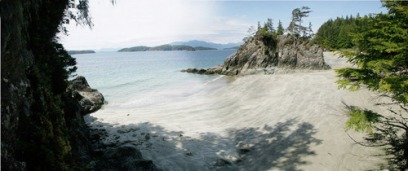Finally! I have heard back from Navdanya and they have accepted my application for a practicum placement! Yay! I am eagerly looking forward to the next steps of formalizing some of the specifics and getting a plane ticket! Everything seems to be coming together.
I am sequestered away over reading break on the far west coast of Vancouver Island in the small community of Bamfield, sheltered by a roaring fireplace and a wall of Vandana Shiva's books. I am trying to learn everything that I can. What does food sovereignty mean? How does food security link with broader social issues? How is Ms. Shiva's work applicable in a Canadian/International context? What can I bring to this organization with my unique perspective as a social worker? Where does ecofeminism stand within the larger field of eco justice and ecology? I am having the chance to have some wonderful conversations and learning opportunities, surrounded by my brother and partner who are both biologists.
I am amazed at how Navdanya's work brings together so many of my interests, and offers a chance to work at many levels of organization and structure. While it sounds like the learning opportunities are vast and fairly open and flexible, for my own sanity I would like to have at least a vague idea of what I could be involved with when I arrive there. I love the idea of working with a group of students around environmental issues, and I think it would be very important to be at Navdanya for the organizational meetings which fall around the ‘Grandmothers University' from April 10th - 12th. Vandana Shiva will be at these meetings, and from my understanding, the best chance to work with her directly will come from being involved with these meetings. Being in India for these dates means that I will have to be leaving soon - and perhaps will have to leave school a week early. It is an opportunity that seems too good to miss though!
I feel myself starting to become excited now. It feels like this opportunity is becoming real, and I am recognizing that in a month and a half I will be on my way toward an amazing learning opportunity!
I am sequestered away over reading break on the far west coast of Vancouver Island in the small community of Bamfield, sheltered by a roaring fireplace and a wall of Vandana Shiva's books. I am trying to learn everything that I can. What does food sovereignty mean? How does food security link with broader social issues? How is Ms. Shiva's work applicable in a Canadian/International context? What can I bring to this organization with my unique perspective as a social worker? Where does ecofeminism stand within the larger field of eco justice and ecology? I am having the chance to have some wonderful conversations and learning opportunities, surrounded by my brother and partner who are both biologists.
I am amazed at how Navdanya's work brings together so many of my interests, and offers a chance to work at many levels of organization and structure. While it sounds like the learning opportunities are vast and fairly open and flexible, for my own sanity I would like to have at least a vague idea of what I could be involved with when I arrive there. I love the idea of working with a group of students around environmental issues, and I think it would be very important to be at Navdanya for the organizational meetings which fall around the ‘Grandmothers University' from April 10th - 12th. Vandana Shiva will be at these meetings, and from my understanding, the best chance to work with her directly will come from being involved with these meetings. Being in India for these dates means that I will have to be leaving soon - and perhaps will have to leave school a week early. It is an opportunity that seems too good to miss though!
I feel myself starting to become excited now. It feels like this opportunity is becoming real, and I am recognizing that in a month and a half I will be on my way toward an amazing learning opportunity!

 RSS Feed
RSS Feed